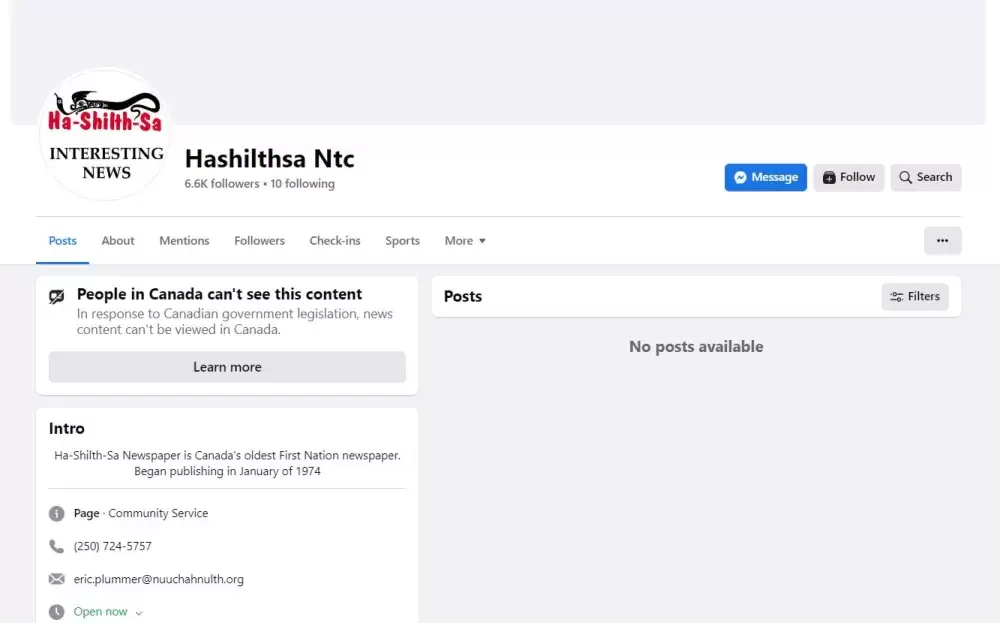Facebook is being heavily criticized by federal officials, as the site continues to block news with British Columbia under a state of emergency and over 20,000 in the Northwest Territories facing an evacuation order due to wildfires.
Prime Minister Justin Trudeau took aim at the social media giant on Monday, Aug. 21, amid the worst forest fire season in Canada’s history.
"It is so inconceivable that a company like Facebook is choosing to put corporate profits ahead of ensuring that local news organizations can get up to date information to Canadians and reach them where Canadians spend a lot of their time online on social media, on Facebook," he said.
This summer the social media site’s parent company Meta began blocking links to Canadian news sources, a move that extended to the Ha-Shilth-Sa, leaving the 6,600 who follow its Facebook page with a blank template as of mid-August. This has affected news sites across the country, along with many of their Instagram pages as well due to Meta also owning the photo sharing platform.
Facebook’s blackout to certain sites is in response to The Online News Act, legislation that received royal assent in Ottawa in June 22. Bill C-18 is designed to force Facebook and Google to make deals with news companies, sharing advertising revenue from articles that appear in online feeds. Its aim is to “level the playing field” between social media and news outlets through revenue sharing, establishing “a mandatory arbitration framework” when agreements can’t be reached, according to the federal government’s description of the act. Financial contributions can be required by the Minister of Canadian Heritage to help the “sustainability of the Canadian news marketplace” based on the estimated revenues of social media platforms in the country.
The tide of online viewership and profits has flowed to social media in recent years. For well over a decade newspapers have been bleeding money, causing many to close across the country or cut down on their staff to unsustainable levels. Meanwhile social media has transformed the means that many people get the information they want. As Facebook saw $32 billion in revenue over the last fiscal quarter, with $7.8 billion in profits, Canadian news companies continued to see losses, totalling $36.7 million over the first six months of 2023 for Postmedia, for example.
Meta has defended its action to shut out Canadian news, saying this was only done to comply with the new legislation.
“We have been transparent and have made it clear to the Canadian government that the legislation misrepresents the value news outlets receive when choosing to use our platforms,” stated the Facebook owner. “The legislation is based on the incorrect premise that Meta benefits unfairly from news content shared on our platforms, when the reverse is true. News outlets voluntarily share content on Facebook and Instagram to expand their audiences and help their bottom line. In contrast, we know the people using our platforms don’t come to us for news.”
But it appears that many do look to Facebook first to get up-to-date information, particularly among the Nuu-chah-nulth audience. This is reflected in the high numbers of followers for the Ha-Shilth-Sa page, as well as other Facebook sites like AV Nuu-chah-nulth Chatter (2,200 followers), Ahousaht Nation (2,873), Tseshaht Events and Happenin’s (845) and Ditidaht First Nation (861).
Courtenay-Alberni MP Gord Johns said Facebook is critical to reach many constituents in his riding, particularly those who live in remote communities.
“This is a serious issue when media and good local journalism is being blocked,” he said. “The fact that people can’t get that from our local news outlet is absolutely appalling, disgraceful and it’s totally unacceptable.”
Johns is concerned that Facebook’s current tactic is feeding the spread of misinformation on social media while emergencies are unfolding.
“This is what big corporations do, they bully when they’ve 80 per cent of market share,” he said. “They don’t want to share revenue, and now they’re bullying a whole country. We can’t back down.”
Johns wants the federal government to get the large media to negotiate.
“My understanding is that they are working with Google, but they need Meta to come to the table and get an agreement done,” he said.
Similar legislation was introduced in Australia in February 2021, resulting in Facebook blocking news on its platform in that country as well. But about a week later a deal was reached with the Australian government, resulting in over 30 agreements between Facebook, Google and news publishers, worth an estimated $200 million in Australian dollars annually for the country’s journalism.
But with the Canadian legislation due to take full effect at the end of year, it appears that Facebook’s owner has little interest in make news part of its future.
“Meta does not scrape content or links to news content,” stated the company. “Posts with links to news articles make up less than three per cent of what people see in their Facebook Feed, and Canadians tell us they want to see less news and political content. We have repeatedly shared with the government that news content is not a draw for our users and is not a significant source of revenue for our company.”
“I’m hoping that with enough pressure they’re going to come to terms to the realization that they’ve got a monopoly on the market share right now, and they need to contribute so that we don’t lose really important, critical publications,” said Johns.


